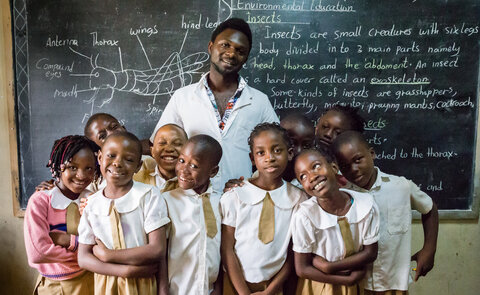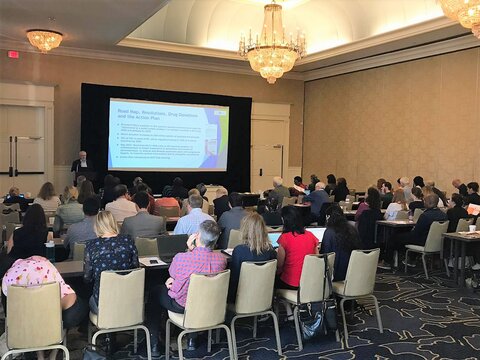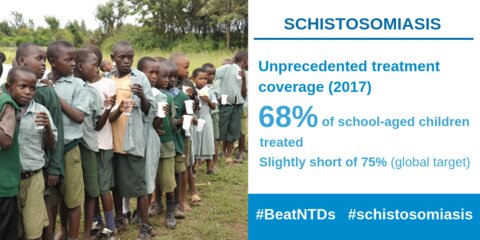GSA End of Year Letter
What happened in 2018?
Collaborating with partners and the schistosomiasis community we have been working hard to accelerate progress towards the control and elimination of schistosomiasis. We are delighted to share with you some of the activities and outputs so that we can all celebrate the growing success of the GSA and ensure that the momentum carries forward into 2019. We would like to thank all of you for your continued support and to wish you "Happy Holidays" and a joyous New Year!
Schistosomiasis Strategic Action Plan
In April this year GSA partners and stakeholders met in London to discuss and refine a framework of actions needed to speed up the progress of schistosomiasis control and elimination. The meeting closed with an agreed strategic action plan for schistosomiasis.
Following this meeting the GSA has been busy aligning its activities to the Schistosomiasis Action Plan, particularly through the involvement of the working groups. GSA working groups bring relevant experts and stakeholders together to produce tangible outputs addressing specific challenges or barriers to schistosomiasis control and elimination. The GSA currently has 4 working groups: Implementation (IWG), Behaviour Change and Health Education (BCHE WG), Monitoring and Evaluation (M&E WG) and Research (RWG). Each working group has two co-chairs that direct and oversee the development of working group outputs.
GSA Working Groups

This year two new working groups were established, BCHE and M&E and both have hit the ground running!
The BCHE working group organised a workshop at the NTD NGO Network annual conference in Addis Ababa this September. The workshop was entitled "Behaviour Change: Practical education approaches, promotion strategies, and change interventions for improving the effectiveness of NTDs Programmes". You can read about the workshop and access the workshop slides and handouts on the GSA website. The BCHE is reviewing schistosomiasis behaviour change activities to identify evidence-based methodologies, gaps and solutions to progress this crucial intervention.
The M&E working group immediately set to work looking at precision mapping. The group developed a successful proposal for COR NTD called Shrinking the Map and discussing the evidence and programmatic needs for precision mapping, particularly the methodology, feasibility and cost, using modelling and case studies. The M&E working group is continuing to develop this work with the NTD modelling consortium, ESPEN and others and is participating in the WHO initiative examining impact assessment and remapping.
The Implementation working group (IWG) has reviewed the Schistosomiasis Action Plan and developed its list of priority actions. SCI together with ESPEN and IWG partners are working to identify schistosomiasis treatment gaps through a PC gap analysis. Members of the IWG have also been using and reviewing the GSA Donor Coordination Tool for Praziquantel.
The research working group (RWG) organised a key meeting in New Orleans in October, in between COR NTD and ASTMH. The meeting entitled "The Schistosomiasis Action Plan: Next Generation Research on the Road towards Elimination" had 5 sessions: Schistosomiasis Action Plan, Updates from COR NTD schistosomiasis session, FGS and measuring morbidity, Advances in vaccines, diagnostics and snail control, and Progress towards schistosomiasis elimination. You can access the meeting report and the shared slides on the GSA resources page.
Read About Our Working Groups through the box links on the right.
Meeting Reports

GSA members contributed and led 4 schistosomiasis related sessions at COR NTD in October 2018 covering precision mapping, M&E, persistent prevalence areas and behaviour change. A summary of the sessions can be found in the meeting report of the GSA New Orleans research meeting.
The GSA and ESPEN held a joint side meeting on Schistosomiasis Elimination at the NTD programme mangers meeting in Kigali in July 2018, you can access the meeting report here.
Advocacy
World Health Organization (WHO), Joint United Nations Programme on HIV/AIDS (UNAIDS), Uniting to Combat NTDs (UTC) and GSA have together been raising the profile of Female Genital Schistosomiasis (FGS) and its impact on reproductive and sexual health. With growing evidence of the impact of genital schistosomiasis on HIV risk the WHO and UNAIDS called for the joint screening and testing of HIV, STIs, cervical cancer and FGS at the 22nd International AIDS conference in Amsterdam in July 2018. UTC developed a policy document on FGS highlighting how preventative chemotherapy can prevent the development of this debilitating disease and help protect reproductive health. To read more about genital schistosomiasis please visit our blog on Schistosomiasis and the impact on sexual and reproductive health.
WHO News

Finally, we close the year with some excellent news from the WHO. The latest data (2017) 98.7 million people (81.8 million SAC and 16.9 million adults) received treatment for schistosomiasis. The 81.8 million school-aged children represent 68% coverage, a heartening increase from 2016’s 53.7% coverage. By keeping up this trend and increasing our efforts we will reach the NTD Roadmap 2012 target of treating 75% of school-aged children by 2020.
A huge success achieved by all involved with this massive public health initiative!
We would like to take this opportunity to thank you all for your collaborative work and much look forward to working with you in 2019!
The GSA team
One More Item

One more exciting development to share with you. The GSA has launched a new website and with your help we would like to establish this as the one-stop-shop for all things schisto. Please do have a look and if you have any feedback or suggestions, we would love to hear from you.
We have set up a closed GSA Network on our website which is for anyone working on schistosomiasis research, and control and elimination programmes. The network aims to facilitate and encourage communication between schistosomiasis experts and those working on schistosomiasis related activities (NTD program managers, NGOs, clinicians, early-career researchers and PhD students etc). If this is you please do join the network, the schistosomiasis community needs you, it is easy to register on our Members page.
